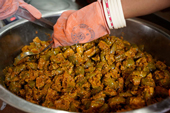
The art of pickle-making
ourneying through one of mankind’s oldest traditions
Whether it’s a paratha or a piping hot khichdi, no Indian meal is complete without a generous dollop of a pickle. For many of us, pickles are much more than just an accompaniment. It’s a journey down memory lane, of the love and labor of our grandmothers who took pride in their secret recipes and techniques passed on to them over generations. Let’s take a look at what this ancient art is all about.
An ancient tradition
Pickling is an ancient practice, almost as old as cultivation. Whenever there was an abundance of a certain fruit or vegetable, it would be pickled so that it could be consumed long after its season had ended. In some cultures, pickles also served as precious food reserves in times of scarcity.
In India, making pickles is a labor-intensive process spread over several days, traditionally associated with women, who would meticulously prepare the fruit, hand-pound the spices, and mix them in ceramic jars with a combination of salt/sugar and oil. The jars were left to cure to perfection in natural sunlight and then aged over anywhere between a few days to even a few years!
Reviving a dying art
Until recently, almost every household had its own trademark style of preparing pickles. However, with modernization, only a few households are able to invest the time and labor to upkeep this laborious practice. As a result, a number of mass-produced pickles have entered the market, claiming to have the ‘homemade touch’ of our mothers and grandmothers. Ironically, most of these pickles contain artificial preservatives and poor-quality oil that do more damage than good to our health.

But all hope is not lost. Thankfully, we are seeing the emergence of micro-enterprises of women who are reviving the tradition of pickle-making as a means of livelihood and economic empowerment. At Katori, rural women are engaged at every step, right from growing and harvesting the fruit, to carefully preparing, curing, and aging pickles and packaging them in airtight glass jars. Every minute detail is tended to, from sourcing the finest quality of fruit and hand-pounding the spices to using Katori’s in-house virgin wood-pressed mustard oil. Above all, they are 100% natural and preservative-free.
In Ayurveda, pickles are said to have probiotic properties that improve ‘Agni’ or the digestive fire and improve metabolism. Good quality pickles that are naturally fermented are therefore a great way to include fermented food in our diet. Katori pickles come in several variants – Lemon, Sweet Lemon, Mango, Lisoda, Singhara, Garlic and Mixed Vegetable. Give it a try and tell us if it took you down memory lane!